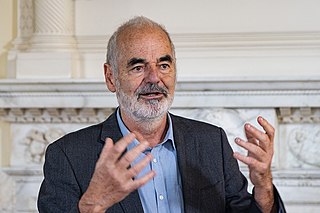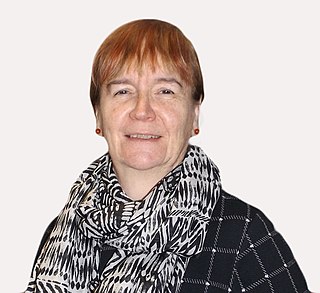Related Research Articles
In statistics, Markov chain Monte Carlo (MCMC) is a class of algorithms used to draw samples from a probability distribution. Given a probability distribution, one can construct a Markov chain whose elements' distribution approximates it – that is, the Markov chain's equilibrium distribution matches the target distribution. The more steps that are included, the more closely the distribution of the sample matches the actual desired distribution.

Sir David John Spiegelhalter is a British statistician and a Fellow of Churchill College, Cambridge. From 2007 to 2018 he was Winton Professor of the Public Understanding of Risk in the Statistical Laboratory at the University of Cambridge. Spiegelhalter is an ISI highly cited researcher.
The deviance information criterion (DIC) is a hierarchical modeling generalization of the Akaike information criterion (AIC). It is particularly useful in Bayesian model selection problems where the posterior distributions of the models have been obtained by Markov chain Monte Carlo (MCMC) simulation. DIC is an asymptotic approximation as the sample size becomes large, like AIC. It is only valid when the posterior distribution is approximately multivariate normal.
Approximate Bayesian computation (ABC) constitutes a class of computational methods rooted in Bayesian statistics that can be used to estimate the posterior distributions of model parameters.

Sander Greenland is an American statistician and epidemiologist with many contributions to statistical and epidemiologic methods including Bayesian and causal inference, bias analysis, and meta-analysis. His focus has been the extensions, limitations, and misuses of statistical methods in nonexperimental studies, especially in postmarketing surveillance of drugs, vaccines, and medical devices. He received honors Bachelor's and master's degrees in mathematics from the University of California, Berkeley, where he was Regent's and National Science Foundation Fellow in Mathematics, and then received Master's and Doctoral degrees in epidemiology from the University of California, Los Angeles (UCLA), where he was Regent's Fellow in Epidemiology. After serving as an assistant professor of biostatistics at Harvard, he joined the UCLA Epidemiology faculty in 1980 where he became Professor of Epidemiology in the Fielding School of Public Health in 1989, and Professor of Statistics in the UCLA College of Letters and Science in 1999. He moved to Emeritus status in 2012 and the following year he was awarded an honorary Doctor of Medicine by the University of Aarhus, Denmark.

Richard John Samworth is the Professor of Statistical Science and the Director of the Statistical Laboratory, University of Cambridge, and a Teaching Fellow of St John's College, Cambridge. He was educated at St John's College, Cambridge. His main research interests are in nonparametric and high-dimensional statistics. Particular topics include shape-constrained density estimation and other nonparametric function estimation problems, nonparametric classification, clustering and regression, the bootstrap and high-dimensional variable selection problems.
David Firth is a British statistician. He is Emeritus Professor in the Department of Statistics at the University of Warwick.
Sudipto Banerjee is an Indian-American statistician best known for his work on Bayesian hierarchical modeling and inference for spatial data analysis. He is Professor of Biostatistics and Senior Associate Dean in the School of Public Health at the University of California, Los Angeles. He served as the Chair of the Department of Biostatistics at UCLA from 2014 through 2023. He served as the elected President of the International Society for Bayesian Analysis in 2022.
David L. Banks is an American statistician at Duke University.
Noel Andrew Cressie is an Australian and American statistician. He is Distinguished Professor and Director, Centre for Environmental Informatics, at the University of Wollongong in Wollongong, Australia.
Alan Enoch Gelfand is an American statistician, and is currently the James B. Duke Professor of Statistics and Decision Sciences at Duke University. Gelfand’s research includes substantial contributions to the fields of Bayesian statistics, spatial statistics and hierarchical modeling.

Ethel Marian Scott, is a Scottish statistician, author and academic, specialising in environmental statistics and statistical modelling. She is Professor of Environmental Statistics at the University of Glasgow. She is additionally vice-president (International) of the Royal Society of Edinburgh, and a member of the Scottish Science Advisory Council.
Hui Zou is currently a professor of statistics at the University of Minnesota.
Raquel Prado is a Venezuelan Bayesian statistician. She is a professor of statistics in the Jack Baskin School of Engineering of the University of California, Santa Cruz, and has been elected president of the International Society for Bayesian Analysis for the 2019 term.
John D. Storey is the William R. Harman '63 and Mary-Love Harman Professor in Genomics at Princeton University. His research is focused on statistical inference of high-dimensional data, particularly genomic data. Storey was the founding director of the Princeton University Center for Statistics and Machine Learning.

Peter Lukas Bühlmann is a Swiss mathematician and statistician.

Roderick Joseph Alexander Little is an academic statistician, whose main research contributions lie in the statistical analysis of data with missing values and the analysis of complex sample survey data. Little is Richard D. Remington Distinguished University Professor of Biostatistics in the Department of Biostatistics at the University of Michigan, where he also holds academic appointments in the Department of Statistics and the Institute for Social Research.
Richard J. Boys was a statistician best known for his contributions to the Bayesian inference, hidden Markov models and stochastic systems.
Angelika van der Linde-Ploumbidis is a statistician. She earned a Ph.D in 1982 or 1983 at the Freie Universität Berlin with the dissertation Zur numerischen Behandlung von Versuchsplanungsproblemen für lineare Regressionsmodelle mit korrelierten Beobachtungen.
In statistics, cluster analysis is the algorithmic grouping of objects into homogeneous groups based on numerical measurements. Model-based clustering bases this on a statistical model for the data, usually a mixture model. This has several advantages, including a principled statistical basis for clustering, and ways to choose the number of clusters, to choose the best clustering model, to assess the uncertainty of the clustering, and to identify outliers that do not belong to any group.
References
- 1 2 3 4 Curriculum vitae, retrieved 2015-07-05.
- ↑ David Dunson at the Mathematics Genealogy Project